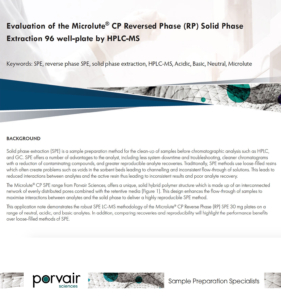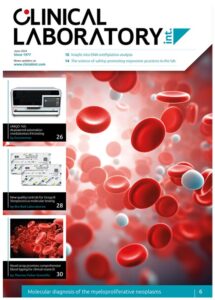Evaluation of the Microlute® CP Reversed Phase Solid Phase Extraction 96 well-plate by HPLC-MS
BACKGROUND
Solid phase extraction (SPE) is a sample preparation method for the clean-up of samples before chromatographic analysis such as HPLC, and GC. SPE offers a number of advantages to the analyst, including less system downtime and troubleshooting, cleaner chromatograms with a reduction of contaminating compounds, and greater reproducible analyte recoveries. Traditionally, SPE methods use loose-filled resins which often create problems such as voids in the sorbent beds leading to channelling and inconsistent flow-through of solutions. This leads to reduced interactions between analytes and the active resin thus leading to inconsistent results and poor analyte recovery.
A Porvair Sciences Application Note
The Microlute® CP SPE range from Porvair Sciences, offers a unique, solid hybrid polymer structure which is made up of an interconnected network of evenly distributed pores combined with the retentive media (Figure 1). This design enhances the flow-through of samples to maximise interactions between analytes and the solid phase to deliver a highly reproducible SPE method.
This application note demonstrates the robust SPE LC-MS methodology of the Microlute® CP Reverse Phase (RP) SPE 30 mg plates on a range of neutral, acidic, and basic analytes. In addition, comparing recoveries and reproducibility will highlight the performance benefits over loose-filled methods of SPE.
- Download the Porvair Sciences Application Note (PDF: 6.6MB)




